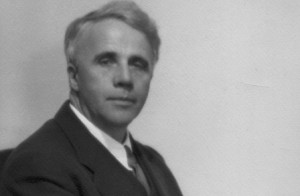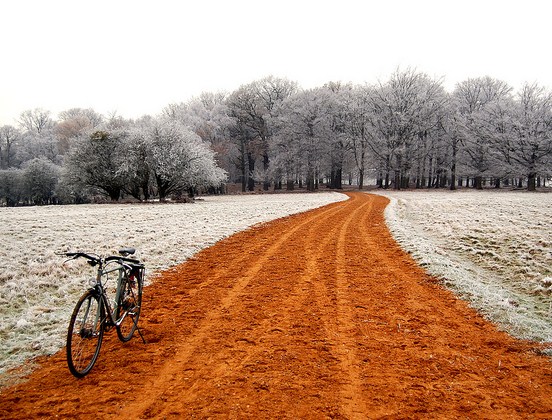Stopping By Woods on a Snowy Evening
When I was in junior high and high school, there was one poem that had managed to find its way into all of the textbooks for American literature: “Stopping by Woods on a Snowy Evening” by Robert Frost. I don’t think I ever heard from a teacher (or read in a textbook) anything about the context of the poem, but context didn’t matter. American poetry meant Robert Frost, and Robert Frost meant “Stopping by Woods on a Snowy Evening.”
If that poem alone wasn’t enough, a second Frost poem sealed the contract: “The Road Not Taken.” For tens of millions of Baby Boomers, Robert Frost, and these two poems in particular, were our first definition of poetry. (One American literature teacher I had in high school had us read Frost first, and then start at the chronological beginning.)
I don’t know if “Stopping by Woods on a Snowy Evening” is still included in textbooks today. But it was an enormously influential poem, and even Frost considered it that way, having told fellow poet Louis Untermeyer (who was poet laureate consultant to the Library of Congress in 1961) that the poem was “my best bid for remembrance.”
It is a startlingly, and perhaps deceptively, simple poem:
Stopping By Woods on a Snowy Evening
Whose woods these are I think I know.
His house is in the village, though;
He will not see me stopping here
To watch his woods fill up with snow.
My little horse must think it queer
To stop without a farmhouse near
Between the woods and frozen lake
The darkest evening of the year.
He gives his harness bells a shake
To ask if there is some mistake.
The only other sound’s the sweep
Of easy wind and downy flake.
The woods are lovely, dark, and deep,
But I have promises to keep,
And miles to go before I sleep,
And miles to go before I sleep.
When I was in high school, I liked to think that the last two stanzas were from the perspective of the horse.

The poem was written in 1922 and published in 1923 as part of Frost’s New Hampshire collection. And true to Frost’s expectation, it is the poem he’s likely best remembered for.
It was quoted at John F. Kennedy’s funeral. Frost was a favorite poet of the President, which should not be a surprise—many of Kennedy’s speeches use the simple and straightforward language that Frost uses in his poems. (Reading Frost’s poetry is, for me, a long-time speechwriter, almost like reading short speeches.) It was quoted at the funeral of Canadian Prime Minister Pierre Trudeau. Nehru kept the last stanza of the poem close at hand.
Where did the poem come from—where did Frost find his inspiration for it?
The story is that he had spent the entire night at his home in Vermont writing the title poem of what became the New Hampshire collection. When he finished, he walked outside, and saw the sunrise. And in that moment, “Stopping by Woods on a Snowy Evening” was born, “without strain, ” Frost said later.
Of course, we could argue that no poem is “just born.” Ideas can occur suddenly, inspired by a sunrise, a child’s smile, the wind rustling the trees, a bird bathing in a birdbath— sources of sudden inspiration are boundless. But had Frost not been living in Vermont that winter and instead spending some time down in Key West, his poem may not have happened at all.
Frost was also 48 when he wrote it, and 46 when he wrote “The Road Not Taken.” These are not the poems of youth; they are poems of middle age, beginning to come to grips with the years ahead, and mortality.
Both poems, and especially “Stopping by Woods, ” left significant imprints on my mind. They come from a twilight time in American education, a time when students were still expected to memorize poems and soliloquies from Shakespeare, when there was a literary canon that almost everyone recognized. They are American poems by a supremely American poet.
The poems may speak more to our collective memory than to contemporary sensibilities, but they still speak.
Image by Sir Pecan Gum. Sourced via Flickr. Post by Glynn Young, author of the novels Dancing Priest and A Light Shining, and the recently published Poetry at Work (T. S. Poetry Press).
BUY ‘HOW TO WRITE A FORM POEM’ NOW!
- Poets and Poems: Peter Murphy and “You Too Were Once on Fire” - October 14, 2025
- “Your Accent! You Can’t Be from New Orleans!” - October 9, 2025
- Poets and Poems: Donna Vorreyer and “Unrivered” - October 7, 2025


Martha Orlando says
Robert Frost will always be my favorite poet and, yes, these two stand out for me as they do for you and millions of others in our baby boomer age bracket. Simple, yet profound in the deepest sense of that word.
Blessings, Glynn!
SimplyDarlene says
Kudos to whomever selected that image as it combines both poems into one. And for me, the bike tells of a coming, rather than a going (as both Frost poems do for me.) I never gave thought to the emerging, only to the leaving.
As always, thanks for the teaching Glynn.
By the way, in my sophomore English class we had to memorize and recite Mark Antony’s speech from Julius Caesar – Friends, Romans, countrymen… Everyone knew the day of recitation as the hallways were speckled with students wrapped in white sheet togas.
I don’t know which was worse, the daring risqué chance that one’s sheet would slip and bareness be seen by classmates or the utter fear of not passing the oration test and having to do whole blasted thing again the following year.
Megan Willome says
As a Central Texas girl, I loved the snowy imagery for the same reason you did, Glynn.
There’s a little more to that story of that poem, which is in my WIP. It has to do with where he was going that snowy evening and what he hoped to do–and failed. And whether any of that matters.
Rick Dawson says
When I was a teen, growing up in Massachusetts, I had occasion (as a member of a Boy Scout troop) to spend the night on a small island in Boston harbor. Immediately after dinner, we were invited to come down to the shoreline to hear a special guest speaker who, as it turned out, was Robert Frost. He had an intimate knowledge of the history of the island, and was a master storyteller far and beyond being a poet. The man was telling ghost stories… Ah, Glynn – you have me walking Memory Lane again, and in mid-day, no less 🙂
Thanks!
SimplyDarlene says
wow.zer.
this sounds like the opening for a novel: “to spend the night on a small island in Boston harbor.”
Rick Dawson says
It was a pain falling asleep, Darlene – we were right under the flight path for Logan Airport, and back then planes were flying late into the night. Departures were worse than arrivals. 🙂
Larry Bole says
In spite of the enormous amount of interpretive thought that many critics have devoted to this poem, it’s remarkable to me that the poem is still considered by so many people to be relatively ‘simple’.
Let’s examine, for instance, the contention that “the poem uses simple words, and rhyme.”
Most people would not have to look up any of the words in a dictionary, so in that sense, they are simple. However, as Jeffrey Meyers points out:
“The most amazing thing about this work is that three of the fifteen lines (the last line repeats the previous one) are transformations from other poems. ‘He gives his harness bells a shake’ comes from Scott’s ‘The Rover’ (in Palgrave): ‘He gave the bridle-reins a shake’. ‘The woods are lovely, dark and deep’ comes from Thomas Lovell Beddoes’ ‘The Phantom Wooer’: ‘Our bed is lovely, dark, and sweet.’ The concluding ‘And miles to go before I sleep’ comes from Keats’ ‘Keen Fitful Gusts’: ‘And I have many miles on foot to fare.’ Though these three lines are variations from other poets, Frost, writing in the tradition of English verse, makes them original and new, and integrates them perfectly into his own poem.
http://www.english.illinois.edu/maps/poets/a_f/frost/woods.htm
And Steve Pedersen points out, regarding the rhyme scheme (http://rhetoric.sdsu.edu/lore/6_1/6.5_pederson.pdf ):
“…the form of the poem is written as a ‘Rubaiyat,’ also referred to as ‘Omar Khayyam quatrain’ (Cuddo n 612). This is an ancient form of Persian poetry written in quatrains of tetrameter or pentameter. The traditional form of an ‘interlocking rubaiyat’ has a rhyme scheme AABA, BBCB, CCDC, and a final quatrain of DDAD (Turco 106). Frost slightly modifies this form with a DDDD rhyme scheme in the final stanza. The last four lines become enthematic of the modern era — the rhyme is repetitive, persistent and unrelenting — thus giving the poem its momentum…”
Does this have any importance beyond mere concerns of technique? I would suggest that it may enrich the poem to look at the works from which Frost paraphrased lines. I also think that the “Rubaiyat” rhyme scheme gives the poem a forward momentum that, despite most of the poem describing a mostly static, ‘stopped’ scenario, culminates in the relentless repeition of the last quatrain, which describes the speaker’s compulsion to move on. In my opinion the poem’s rhyme scheme is therefore mimetic of this compulsion.
Mark says
Interesting but unless you have references of Frost saying he was influenced by the three poems you mention, pure conjecture.
Larry Bole says
Another thing I’d like to discuss is the idea that the poem “implies the existence of God.” I was not aware of this notion regarding the poem but, in skim-reading some critical commentary, I see that it’s been suggested that the “whose” of “Whose woods these are….” may refer to God, and that “his house” would then refer to a church in the village.
But if that is the case, then one might conclude that God isn’t everywhere, certainly not in the woods. In that sense God would be an absentee owner, who only dwells in a humanly-constructed house of worship. I would say that if the poem does suggest God, it is a view of God that many Christians would find troubling, particularly the assertion that “He will not see me stopping here.” He would therefore not be an omniscient God.